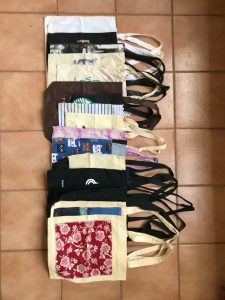Total ban in all businesses from August 3, 2020 onwards
It’s still common to be at the register paying and to realize that we forgot our reusable bag. From August 3 the prohibition of plastic bags will extend to all businesses in Chile. Now the cloth bag is going to be even more part of our daily routine.
Two years of farewell
In 2018 Chile implemented the law that forbids the delivery of plastic bags (http://chaobolsasplasticas.cl). This milestone turned Chile into the first country in Latin America to ban them. Since the law was taken into effect, 5 billion bags have been avoided, according to the Environment Minister, Carolina Schmidt.
The first stage consisted in the maximum of two plastic bags per purchase. After six months, big stores like supermarkets and retailers couldn’t deliver bags anymore. The last phase will begin next August 3, two years after the law had been published. This last stage will completely ban bags in micro, small and medium businesses.
Did you bring you reusable bag?
This question is part of the routine when you buy something in Chile. For those who aren’t used to carrying it with them, usually follows another question: how much does it cost? If you are still part of this group, now it’s going to be even more necessary to carry around our reusable bags. In small stores, where you still can find plastic bags, we’ll have to take our own. Therefore, we can add another single-use plastic product we truly are eliminated from our lives.

My cloth bags. Most are produced locally.
Making my own bags
I have always had some sort of addiction to buying reusable bags, and with years passing by I have a little collection. I like the ones that are made of natural fibers, that way I’m also avoiding another type of plastic: the microfibers that are shed from synthetic fabrics. These little fibers that are released from fabrics like nylon and polyester contribute to 35% of microplastics polluting the ocean. Read more about it in this report https://www.oceancleanwash.org/the-issue/). During quarantine I started to make my own bags with some fabric that I no longer use. Normally, I use them as an everyday bag to carry all my things: reusable bottle, wallet, cell phone and earphones. Also, I take another one in case I need to buy or take something during the day.
Side Effects
Before this law, 3.4 billion bags were used every year in Chile, that’s about 200 bags per person. Even though this legislation represents progress, it wasn’t free of criticism. Some people believe that the implementation was too abrupt, causing some companies to close because they couldn’t adapt fast enough. Also, there were no alternative options proposed, leading to a “tsunami” of alternative bags flooding the market, many of them were even worse for the environment than the banned plastic bags. An example of this are non woven bags.
A step towards the goodbye of more single use plastics
This first step in disposable product regulation opened up a debate: what should we do with the other single use plastic products? Through other legislative initiatives, Chile is trying to take care of all the rest. For example, the Extended Producer Responsibility law that regulates packaging and containers and the bill that seeks to regulate single-use plastic in food establishments. This last one was approved by the Senate on July 8. The project was presented in April 2019 together with Oceana Chile in the Chilean congress. Read it here. If the bill becomes a law, it’ll regulate the delivery of plastic food packages, cutlery, plates, glasses in places that sell food.
The road to eliminate single-use plastic products of our lives requires a collaborative effort from everyone: Legislators, governments, companies, organizations and citizens, we must rethink our relationship with this material. I always ask myself: “Is it really necessary to buy this disposable product that I will only use for a couple minutes and that it’s going to cause damage for hundreds of years?
After two years without plastic bags I can say that I don’t miss them.
PLEASE CONSIDER DONATING TO SUPPORT OUR EFFORTS TO PROTECT OUR WORLD.
